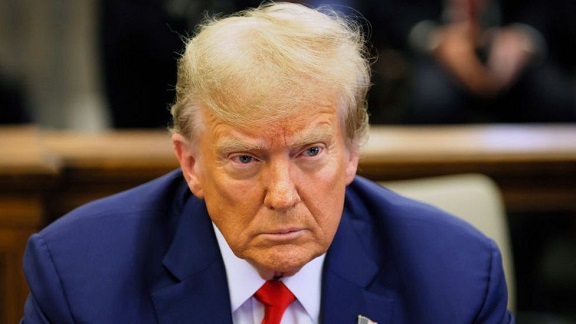Donald Trump was held in contempt of court Tuesday and fined $9,000 for repeatedly violating a gag order that barred him from making public statements about witnesses, jurors and some others connected to his New York hush money case.
If he does it again, the judge warned, he could be jailed.
Prosecutors had alleged 10 violations, but New York Judge Juan M. Merchan found there were nine. Trump stared down at the table in front of him as the judge read the ruling, frowning slightly.
It was a stinging rebuke of the presumptive Republican presidential nominee’s insistence that he was exercising his free speech rights and a reminder that he’s a criminal defendant subject to the harsh realities of trial procedure. And the judge’s remarkable threat to jail a former president signaled that Trump’s already precarious legal standing could further spiral depending on his behavior during the remainder of the trial.
Merchan wrote that he is “keenly aware of, and protective of,” Trump’s First Amendment rights, “particularly given his candidacy for the office of President of the United States.”
“It is critically important that defendant’s legitimate free speech rights not be curtailed, that he be able to fully campaign for the office which he seeks and that he be able to respond and defend himself against political attacks,” Merchan wrote.
Still, he warned that the court would not tolerate “willful violations of its lawful orders and that if necessary and appropriate under the circumstances, it will impose an incarceratory punishment.”
With that statement, the judge drew nearer the specter of Trump becoming the first former president of the United States behind bars.
“This gag order is totally unconstitutional,” Trump said as court adjourned after a day that included testimony from a Hollywood lawyer who negotiated two of the hush money deals at issue in the case. “I’m the Republican candidate for president of the United States ... and I’m sitting in a courthouse all day long listening to this stuff.”
Trump is used to having constant access to his social media bullhorn to slam opponents and speak his mind. After he was banned from Twitter following the Jan. 6, 2021, attack on the Capitol by his supporters, Trump launched his own platform, where his posts wouldn’t be blocked or restricted. He has long tried to distance himself from controversial messages he’s amplified to his millions of followers by insisting they’re “only retweets.”
But he does have experience with gag orders, which were also imposed in other legal matters. After he was found to have violated orders in his civil fraud trial, he paid more than $15,000 in fines.
Trump also is subject to a gag order in his federal criminal election interference case in Washington. That order limits what he can say about known or reasonably foreseeable witnesses in the case and about court staff and other lawyers, though an appeals court freed him to speak about special counsel Jack Smith, who brought the case.
AP





